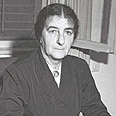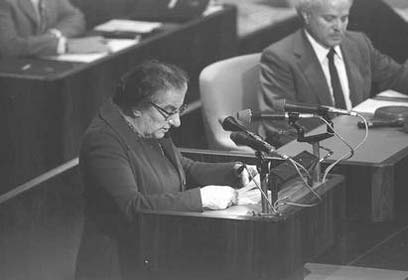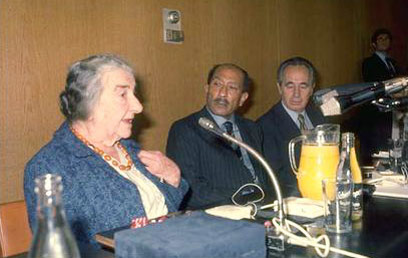
In Golda’s kitchen, the smells of freshly brewed coffee and cigarette smoke from her Chesterfields or Superfines mingled with talk of the state of affairs in the country. There around her green Formica table while the percolators in the background were busy doing their thing the political intrigues of tomorrow were being concocted and the most confidential and secret plans cooked up.
“It was a mark of honor to be invited to meetings in Golda’s kitchen. It showed that you were important,” said Eliav, who was a regular at the kitchen cabinet meetings. “She was an excellent baker. We all loved the once-a-week ritual. There were people there from ‘our ministers’ forum and from the ‘our allies’ forum and she would serve her guests coffee and cheesecake or apple strudel. She flat out refused any kind of help. It would insult her.”

Speaking at the Knesset 1973
In December 1972, officials from the Mapam party publicly protested their exclusion from the sessions. “We demand to be fully involved at all levels including Golda’s kitchen cabinet,” demanded party member Haikel Ramon at a meeting. Yedioth Achronoth newspaper reported that the next day the prime minister who was at that meeting said with a smile: “There is a limit to the number of people my kitchen will hold.”
MK Yitzhak Ben-Aharon, the Histadrut head at the time said in response, “So we have to set up a kibbutz-sized kitchen.” And another member suggested that “We can ask the housing minister to enlarge Golda’s kitchen.”
But not everyone thought the kitchen, among the pots and pans, was the appropriate place to make political decisions. “I don’t agree that Golda’s kitchen is the place to be cooking up affairs of state. A more suitable venue should be found,” criticized then Knesset member Shulamit Aloni. She still has a caricature hanging on the wall of her kitchen by the late Ze'ev, depicting the prime minister stirring a pot while around her are sitting ministers Pinchas Sapir and Israel Galili. Aloni is watching from the side, a bitter look on her face.
Golda would prepare breakfast herself. Coffee or tea, bread with cheese and a little honey. In 1971 it was written that “she doesn’t need to diet.” Esther Sheichkorn, who served as Golda’s secretary said that “she isn’t a gourmet or fussy about her food. She ate simply. When she was in the party she was happy with a piece of meat and some grains and a glass of juice – that was it.”
“Golda dined on politics,” remembers Shimon Avizemer, a close associate. She didn’t cook much because she was hardly at home. Nevertheless she made gefilte fish once a week and took it with her on her weekly visit to her daughter at Kibbutz Revivim in the Negev.
During one of her visits to the US, she was asked by one of the Washington newspapers: “Mrs. Meir, your seven-year-old grandson Gideon says that you make the best gefilte fish in the world. If that is so how about giving us your recipe.”
Prime Minister Meir smiled and replied, “My grandson is not so objective about his grandmother nor am I about him,” – and refused to share her recipe. During the same visit, as she always did during her travels in the US, especially in New York, Golda would make time to shop for kitchen utensils. As someone who was known for her weakness for kitchen gadgets she made sure to pick up the latest items.
One Passover eve shortly after she was elected as prime minister in 1969, she traveled to Kibbutz Revivim. There she addressed the members in the communal dining room telling them about her first days as a new immigrant from the United States on Kibbutz Merhavia in the Jezreel Valley.
In her autobiography she said: “Baking bread was for me a thing of wonder. There were 30-32 of us then. We would buy the flour from the Arabs in Nazareth and it wasn’t as refined as it should be so bread came out purple and sometimes rather sour. What scared me more than anything was how the kibbutz women wanted to teach me to knead the dry dough. When you pour a lot of water on it, it is easier to knead but you won’t get bread out of it. The trick is to knead the dough with a small amount of water. When I finally learned how to do it I was truly proud of myself.”
The young kibbutzniks also bought their oil from the Arabs but Golda described it as “bitter as death.” Whatever they cooked and baked with it was inedible. “Chick peas we soaked for 24 hours, and cooked with onion – that was soup. Then it became cereal and in the evening we would grind it up with onions and it was salad.”

Golda Meir with Anwar Sadat in 1977
They would drink their tea directly from the water tank. “I don’t know how many times a week we actually drank tea from boiled water. Who had the patience to wait for the water in the tank to boil? The water warmed up – they drank tea. For every drop of tea they had to go to the kitchen. I believe that if the kibbutzim then had ways and the means for two issues that have become routine now: private bathrooms and the ability to boil water for a cup of tea in one’s room – perhaps thousands of people who left the kibbutzim might have stayed,” she smiled.
A cookbook of recipes from famous people was published in the '70s by the British consumer league of Israeli products. It included recipes from the collections of well-known Israeli public figures and among them Golda Meir:
Kibbutz breakfast
Ingredients: 3 tomatoes
1 cucumber
3 carrots
Head of lettuce,
1 green pepper
7 radishes
3 green onions
1 hard boiled egg
For the dressing:
3 tsp lemon juice
3 tsp oil
1 tsp mayonnaise
Salt and black pepper to taste
Chop up the green onion and tear the lettuce.
Grate the carrots and the egg and chop up the rest of the vegetables into small pieces.
Put them all in a large salad bowl.
Whip up the dressing ingredients and pour on the salad before serving. Toss gently.















